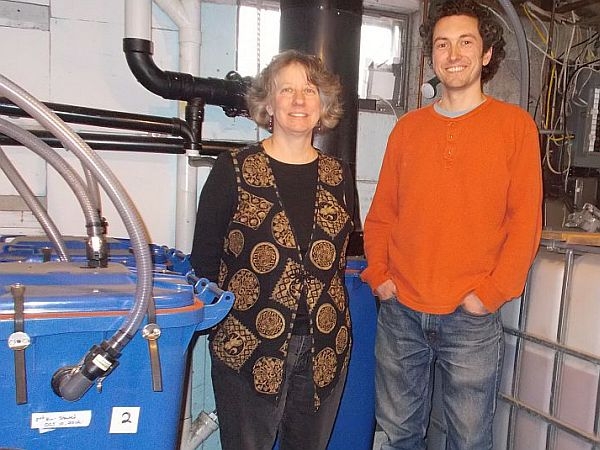
In Brattleboro, a small non-profit group called Rich Earth Institute is researching ways to safely use recycled human urine as a fertilizer.
The US Environmental Protection Agency and several universities are monitoring the group’s efforts. And dozens of Vermonters have changed their bathroom habits to help move the idea forward.
The sound of a toilet flushing is a fact of life in almost every modern household — but not at Kim Nace’s house in Brattleboro.
She’s happy to show off her very different, and very quiet bathroom set up.
"This is our urine diverting resource separating dry composting toilet," she says. "Many people leave this bathroom and they say, "Wow! It’s so quiet!’"
Nace is the co-founder of Rich Earth Institute. The organization is dedicated to studying and advancing the use of human waste as a resource.
Nace’s toilet is enclosed in a wooden base. Under the seat is a blue molded plastic insert, divided into two sections. The front is bowl-shaped. Behind is a large hole. Each section has a pipe leading to a separate container in the basement.
A small fan directs the air — and the odor — downwards through the toilet into the containers.
Also on hand is Abe Noe-Hays. He’s the other founder of Rich Earth Institute and the organizations Director of Research.
"Often I’ve heard people come out and say, ‘Wow! It didn’t smell!’" Noe-Hays comments. "Because they think it will. They’re sure it will."
Noe-Hays says all human waste has value. "But we’re focusing on urine first," he explains, "Because it has the vast majority of nutrients in it — almost all of the nitrogen and most of the phosphorous — and it’s also is free of intestinal pathogens.
Noe-Hays says those nutrients make urine a powerful fertilizer. The practice of flushing it ‘away’ with water, means the nutrients end up in lakes and streams where they fertilize algae blooms and unwanted plant life.
According to Noe-Hays, this approach to human waste not only feeds an endless demand for synthetic fertilizers. It disrupts a natural cycle, in which nutrients from plants, consumed by humans, return to the soil to nourish new plants.
That’s what started happening last summer, when six hundred gallons of urine, donated by local volunteers, were trucked to a Brattleboro farm.
There the Rich Earth Institute carried out the first approved U.S. field trials using recycled urine as a fertilizer. The Brattleboro group had guidance and help from the Environmental Protection Agency, the University of Florida and the University of Vermont.
The experiments included sanitizing the urine by different methods and applying it in test strips.
Brattleboro farmer Jay Bailey owns the hayfields where the tests took place.
"If you walked out there it was plain as day where the urine had been applied," Bailey says. "Because the grass was bright green."
Bailey says the strips treated with urine yielded three times more hay than the strips where no urine was applied.
Bailey adds that urine by itself isn’t a complete fertilizer for food crops. The ratio of nitrogen to other key plant nutrients is too high.
But he says the idea — which has taken hold in Germany and Sweden — is long overdue. He’s enthusiastic about the coming summer’s research.
The institute has a grant from the US Department of Agriculture and is looking for volunteer donors to supply the necessary ingredients.